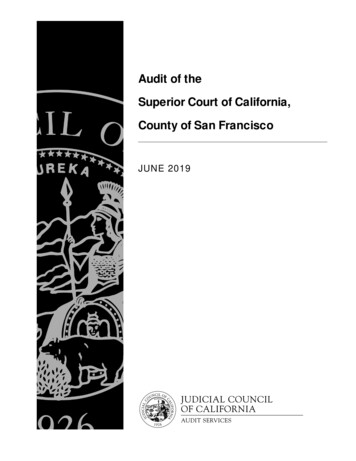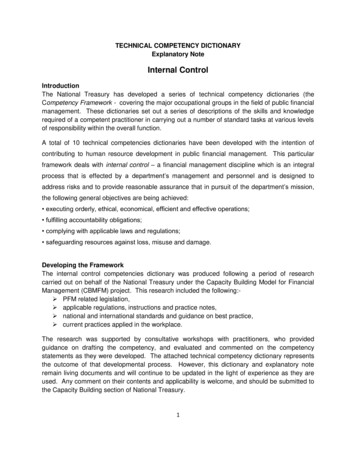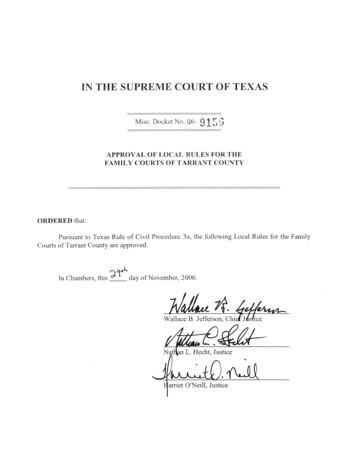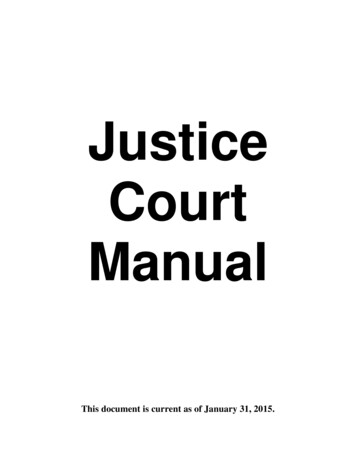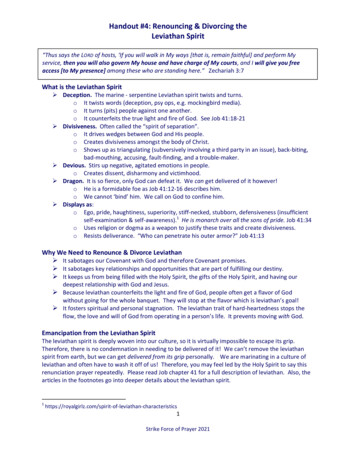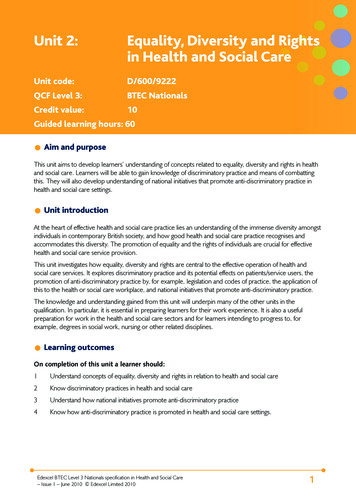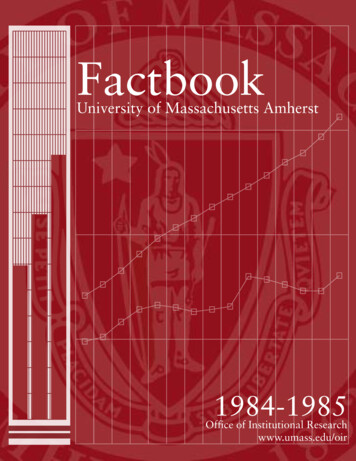
Transcription
THE FAMILY COURTS ACT, 1984ARRANGEMENT OF SECTIONSCHAPTER IPRELIMINARYSECTIONS1. Short title, extent and commencement.2. Definitions.CHAPTER IIFAMILY COURTS3.4.5.6.Establishment of Family Courts.Appointment of Judges.Association of social welfare agencies, etc.Counsellors, officers and other employees of Family Courts.CHAPTER IIIJURISDICTION7. Jurisdiction.8. Exclusion of jurisdiction and pending proceedings.9.10.11.12.13.14.15.16.17.18.CHAPTER IVPROCEDUREDuty of Family Court to make efforts for settlement.Procedure generally.Proceedings to be held in camera.Assistance of medical and welfare experts.Right to legal representation.Application of Indian Evidence Act, 1872.Record of oral evidence.Evidence of formal character on affidavit.Judgment.Execution of decrees and orders.CHAPTER VAPPEALS AND REVISIONS19. Appeal.CHAPTER VIMISCELLANEOUS20.21.22.23.Act to have overriding effect.Power of High Court to make rules.Power of the Central Government to make rules.Power of the State Government to make rules.1
THE FAMILY COURTS ACT, 1984ACT NO. 66 OF 1984[14th September, 1984.]An Act to provide for the establishment of Family Courts with a view to promote conciliation in,and secure speedy settlement of, disputes relating to marriage and family affairs and formatters connected therewith.BE it enacted by Parliament in the Thirty-fifth Year of the Republic of India as follows:—CHAPTER IPRELIMINARY1. Short title, extent and commencement.—(1) This Act may be called the Family Courts Act,1984.(2) It extends to the whole of India except the State of Jammu and Kashmir.(3) It shall come into force on such date1as the Central Government may, by notification in theOfficial Gazette, appoint, and different dates may be appointed for different States.1. This Act shall come into force in—(i)Union territory of Andaman and Nicobar Islands on 19th November, 1986,vide notification No. 79/22/86, dated 19thNovember, 1986, Gazette of India, Extra., Pt. II, Section 1.(ii) Madhya Pradesh on 19thNovember, 1986, vide notification No. 79/6/86, dated 14th November, 1986, Gazette of India,Extra., Pt. II, Section 1.(iii) Uttar Pradesh on 2ndOctober, 1986, vide notification No. 79/11/86-Jus., dated 4th September, 1986, Gazette of India,Pt. II, Section 1.(iv)Delhi on 19th November, 1986,vide notification No. S.O. 863(E), dater 18th November, 1986, Gazette of India, Extra.,Pt. II, Section 3 (ii).(v)Maharashtra on 1stDecember, 1986, vide notification No. S.O. 944(E), dated 5th December, 1986, Gazette of India,Extra., Pt. II, Section 3(ii).(vi)Karnataka on 25thMay, 1987, vide notification No. G.S.R. 685(E), dated 15th May, 1987, Gazette of India, Extra., Pt. II,Section 3(i).(vii)Orissa on 1st May, 1989, vide notification No. S.O. 321(E), dated 27th April, 1989, Gazette of India, Extra, Pt. II,Section 3(ii).(viii)Kerala on 21st October, 1989, vide notification No. 79/5/86, dated 17th October, 1989, Gazette of India, Extra., Pt. II,Section 1.(ix)Goa on 16thApril, 1990, vide notification No. S.O. 328(E), dated 12th April, 1990, Gazette of India, Extra., Pt. II,Section 3(ii).(x)Union territory of Pondicherry on 1st May, 1987, vide notification No. G.S.R. 459 (E), dated 29th April, 1987, Gazette ofIndia, Extra, Pt. II, Section 3(i).(xi)West Bengal on 1stNovember, 1991, vide notification No. 79/12/86-Jus., dated 1st November, 1991, Gazette of India,Extra., Pt. II, Section 1 (E).(xii)Assam on 2nd October, 1991, vide notification No. 79/2/86Jus., dated 30th November, 1991, Gazette of India, Extra.,Pt. II, Section 1 (E).(xiii)Bihar on 10th December, 1991, vide notification No. S.O. 838(E), dated 6th December, 1991, Gazette of India, Extra.,Pt. II, Section 3(ii).(xiv)Manipur on 3rdFebruary, 1992, vide notification No. S.O. 91(E), dated 30th January, 1992, Gazette of India, Extra., Pt.II, Section 3(ii).(xv)Haryana on 2ndNovember, 1992, vide notification No. S.O. 784(E), dated 23th October, 1992, Gazette of India, Extra.,Pt. II, Section 3(i).(xvi)Andhra Pradesh on 15thFebruary, 1995, vide notification No. S.O. 92(E), dated 6th February, 1995, Gazette of India,Extra. Part II, Section 3 (ii).(xvii) Gujarat on 1stJanuary, 2000, vide notification No. S.O. 1268(E), dated 20nd December, 1999, Gazette of India, Extra.,Pt. II, Section 3 (ii).(xviii)Union territory of Daman and Diu on 10th October, 2003, vide notification No. S.O. 1161 (E), dated 14th October,2003, Gazette of India, Extra., Pt. II, Section 3 (ii).2
2. Definitions.—In this Act, unless the context otherwise requires,—(a) “Judge” means the Judge or, as the case may be, the Principal Judge, Additional PrincipalJudge or other Judge of a Family Court;(b) “notification” means a notification published in the Official Gazette;(c) “prescribed” means prescribed by rules made under this Act;(d) “Family Court” means a Family Court established under section 3;(e) all other words and expressions used but not defined in this Act and defined in the Code ofCivil Procedure, 1908 (5 of 1908) shall have the meanings respectively assigned to them in thatCode.CHAPTER IIFAMILY COURTS3. Establishment of Family Courts.—(1) For the purpose of exercising the jurisdiction and powersconferred on a Family Court by this Act, the State Government, after consultation with the High Court,and by notification,—(a) shall, as soon as may be after the commencement of this Act, established for every area in theState comprising of city or town whose population exceeds one million, a Family Court;(b) may establish Family Courts for such other areas in the State as it may deem necessary.(2) The State Government shall, after consultation with the High Court, specify, by notification, thelocal limits of the area to which the jurisdiction of a Family Court shall extend and may, at any time,increase, reduce or alter such limits.4. Appointment of Judges.—(1) The State Government may, with the concurrence of the HighCourt, appoint one or more persons to be the Judge or Judges of a Family Court.(2) When a Family Court consists of more than one Judge,—(a) each of the Judges may exercise all or any of the powers conferred on the Court by this Act orany other law for the time being in force;(b) the State Government may, with the concurrence of the High Court, appoint any of the Judgesto be the Principal Judge and any other Judge to be the Additional Principal Judge;(c) the Principal Judge may, from time to time, make such arrangements as he may deem fit forthe distribution of the business of the Court among the various Judges thereof;(d) the Additional Principal Judge may exercise the powers of the Principal Judge in the event ofany vacancy in the office of the Principal Judge or when the Principal Judge is unable to discharge hisfunctions owing to absence, illness or any other cause.(3) A person shall not be qualified for appointment as a Judge unless he—(a) has for at least seven years held a judicial office in India or the office of a Member of aTribunal or any post under the Union or a State requiring special knowledge of law; or(b) has for at least seven years been an advocate of a High Court or of two or more such Courts insuccession; or(c) possesses such other qualifications as the Central Government may, with the concurrence ofthe Chief Justice of India, prescribe.3
(4) In selecting persons for appointment as Judges,—(a) every endeavour shall be made to ensure that persons committed to the need to protect andpreserve the institution of marriage and to promote the welfare of children and qualified by reason oftheir experience and expertise to promote the settlement of disputes by conciliation and counsellingare selected; and(b) preference shall be given to women.(5) No person shall be appointed as, or hold the office of, a Judge of a Family Court after he hasattained the age of sixty-two years.(6) The salary or honorarium and other allowances payable to, and the other terms and conditions ofservice of, a Judge shall be such as the State Government may, in consultation with the High Court,prescribe.5. Association of social welfare agencies, etc.—The State Government may, in consultation with theHigh Court, provide, by rules, for the association, in such manner and for such purposes and subject tosuch conditions as may be specified in the rules, with a Family Court of—(a) institutions or organisations engaged in social welfare or the representatives thereof;(b) persons professionally engaged in promoting the welfare of the family;(c) persons working in the field of social welfare; and(d) any other person whose association with a Family Court would enable it to exercise itsjurisdiction more effectively in accordance with the purposes of this Act.6. Counsellors, officers and other employees of Family Courts.—(1) The State Government shall,in consultation with the High Court, determine the number and categories of counsellors, officers andother employees required to assist a Family Court in the discharge of its functions and provide the FamilyCourt with such counsellors, officers and other employees as it may think fit.(2) The terms and conditions of association of the counsellors and the terms and conditions of serviceof the officers and other employees, referred to in sub-section (1), shall be such as may be specifiedby rules made by the State Government.CHAPTER IIIJURISDICTION7. Jurisdiction.—(1) Subject to the other provisions of this Act, a Family Court shall—(a) have and exercise all the jurisdiction exercisable by any district court or any subordinate civilcourt under any law for the time being in force in respect of suits and proceedings of the naturereferred to in the Explanation; and(b) be deemed, for the purposes of exercising such jurisdiction under such law, to be a districtcourt or, as the case may be, such subordinate civil court for the area to which the jurisdiction of theFamily Court extends.Explanation.—The suits and proceedings referred to in this sub-section are suits and proceedings ofthe following nature, namely:—(a) a suit or proceeding between the parties to a marriage for a decree of nullity of marriage(declaring the marriage to be null and void or, as the case may be, annulling the marriage) orrestitution of conjugal rights or judicial separation or dissolution of marriage;(b) a suit or proceeding for a declaration as to the validity of a marriage or as to the matrimonialstatus of any person;4
(c) a suit or proceeding between the parties to a marriage with respect to the property of theparties or of either of them;(d) a suit or proceeding for an order or injunction in circumstance arising out of a maritalrelationship;(e) a suit or proceeding for a declaration as to the legitimacy of any person;(f) a suit or proceeding for maintenance;(g) a suit or proceeding in relation to the guardianship of the person or the custody of, or accessto, any minor.(2) Subject to the other provisions of this Act, a Family Court shall also have and exercise—(a) the jurisdiction exercisable by a Magistrate of the first class under Chapter IX (relating toorder for maintenance of wife, children and parents) of the Code of Criminal Procedure, 1973 (2 of1974); and(b) such other jurisdiction as may be conferred on it by any other enactment.8. Exclusion of jurisdiction and pending proceedings.—Where a Family Court has beenestablished for any area,—(a) no district court or any subordinate civil court referred to in sub-section (1) of section 7 shall,in relation to such area, have or exercise any jurisdiction in respect of any suit or proceeding of thenature referred to in the Explanation to that sub-section;(b) no magistrate shall, in relation to such area, have or exercise any jurisdiction or powers underChapter IX of the Code of Criminal Procedure, 1973 (2 of 1974);(c) every suit or proceeding of the nature referred to in the Explanation to sub-section (1) ofsection 7 and every proceeding under Chapter IX of the Code of Criminal Procedure, 1973 (2 of1974),—(i) which is pending immediately before the establishment of such Family Court before anydistrict court or subordinate court referred to in that sub-section or, as the case may be, before anymagistrate under the said Code; and(ii) which would have been required to be instituted or taken before such Family Court if,before the date on which such suit or proceeding was instituted or taken, this Act had come intoforce and such Family Court had been established,shall stand transferred to such Family Court on the date on which it is established.CHAPTER IVPROCEDURE9. Duty of Family Court to make efforts for settlement.—(1) In every suit or proceeding,endeavour shall be made by the Family Court in the first instance, where it is possible to do so consistentwith the nature and circumstances of the case, to assist and persuade the parties in arriving at a settlementin respect of the subject-matter of the suit or proceeding and for this purpose a Family Court may, subjectto any rules made by the High Court, follow such procedure as it may deem fit.(2) If, in any suit or proceeding, at any stage, it appears to the Family Court that there is a reasonablepossibility of a settlement between the parties, the Family Court may adjourn the proceedings for suchperiod as it thinks fit to enable attempts to be made to effect such a settlement.(3) The power conferred by sub-section (2) shall be in addition to, and not in derogation of, any otherpower of the Family Court to adjourn the proceedings.5
10. Procedure generally.—(1) Subject to the other provisions of this Act and the rules, theprovisions of the Code of Civil Procedure, 1908 (5 of 1908) and of any other law for the time being inforce shall apply to the suits and proceedings [other than the proceedings under Chapter IX of the Code ofCriminal Procedure, 1973 (2 of 1974)] before a Family Court and for the purposes of the said provisionsof the Code, a Family Court shall be deemed to be a civil court and shall have all the powers of suchcourt.(2) Subject to the other provisions of this Act and the rules, the provisions of the Code of CriminalProcedure, 1973 (2 of 1974) or the rules made thereunder, shall apply to the proceedings under ChapterIX of that Code before a Family Court.(3) Nothing in sub-section (1) or sub-section (2) shall prevent a Family Court from laying down itsown procedure with a view to arrive at a settlement in respect of the subject-matter of the suit orproceedings or at the truth of the facts alleged by the one party and denied by the other.11. Proceedings to be held in camera.—In every suit or proceedings to which this Act applies, theproceedings may be held in camera if the Family Court so desires and shall be so held if either party sodesires.12. Assistance of medical and welfare experts.—In every suit or proceedings, it shall be open to aFamily Court to secure the services of a medical expert or such person (preferably a woman whereavailable), whether related to the parties or not, including a person professionally engaged in promotingthe welfare of the family as the Court may think fit, for the purposes of assisting the Family Court indischarging the functions imposed by this Act.13. Right to legal representation.—Notwithstanding anything contained in any law, no party to asuit or proceeding before a Family Court shall be entitled, as of right, to be represented by a legalpractitioner:Provided that if the Family Court considers it necessary in the interest of justice, it may seek theassistance of a legal expert as amicus curiae.14. Application of Indian Evidence Act, 1872.—A Family Court may receive as evidence anyreport, statement, documents, information or matter that may, in its opinion, assist it to deal effectuallywith a dispute, whether or not the same would be otherwise relevant or admissible under the IndianEvidence Act, 1872 (1 of 1872).15. Record of oral evidence.—In suits or proceedings before a Family Court, it shall not benecessary to record the evidence of witnesses at length, but the Judge, as the examination of each witnessproceeds, shall, record or cause to be recorded, a memorandum of the substance of what the witnessdeposes, and such memorandum shall be signed by the witness and the Judge and shall form part of therecord.16. Evidence of formal character on affidavit.—(1) The evidence of any person where suchevidence is of a formal character, may be given by affidavit and may, subject to all just exceptions, beread in evidence in any suit or proceeding before a Family Court.(2) The Family Court may, if it thinks fit, and shall, on the application of any of the parties to the suitor proceeding summon and examine any such person as to the facts contained in his affidavit.17. Judgment.—Judgment of a Family Court shall contain a concise statement of the case, the pointfor determination, the decision thereon and the reasons for such decision.18. Execution of decrees and orders.—(1) A decree or an order [other than an order under ChapterIX of the Code of Criminal Procedure, 1973 (2 of 1974)], passed by a Family Court shall have the sameforce and effect as a decree or order of a civil court and shall be executed in the same manner as isprescribed by the Code of Civil Procedure, 1908 (5 of 1908) for the execution of decrees and orders.(2) An order passed by a Family Court under Chapter IX of the Code of Criminal Procedure, 1973 (2of 1974) shall be executed in the manner prescribed for the execution of such order by that Code.6
(3) A decree or order may be executed either by the Family Court which passed it or by the otherFamily Court or ordinary civil court to which it is sent for execution.CHAPTER V1[APPEALS AND REVISIONS]19. Appeal.—(1) Save as provided in sub-section (2) and notwithstanding anything contained in theCode of Civil Procedure,1908 (5 of 1908) or in the Code of Criminal Procedure, 1973 (2 of 1974) or inany other law, an appeal shall lie from every judgment or order, not being an interlocutory order, of aFamily Court to the High Court both on facts and on law.(2) No appeal shall lie from a decree or order passed by the Family Court with the consent of theparties2[or from an order passed under Chapter IX of the Code of Criminal Procedure, 1973 (2 of 1974):Provided that nothing in this sub-section shall apply to any appeal pending before a High Court orany order passed under Chapter IX of the Code of Criminal Procedure, 1973 (2 of 1974) before thecommencement of the Family Courts (Amendment) Act, 1991 (59 of 1991).](3) Every appeal under this section shall be preferred within a period of thirty days from the date ofthe judgment or order of a Family Court.2[(4) The High Court may, of its own motion or otherwise, call for and examine the record of anyproceeding in which the Family Court situate within its jurisdiction passed an order under Chapter IX ofthe Code of Criminal Procedure, 1973 (2 of 1974) for the purpose of satisfying itself as to the correctness,legality or propriety of the order, not being an interlocutory order, and as to the regularity of suchproceeding.]3[(5)] Except as aforesaid, no appeal or revision shall lie to any court from any judgment, order ordecree of a Family Court.4[(6)] An appeal preferred under sub-section (1) shall be heard by a Bench consisting of two or moreJudges.CHAPTER VIMISCELLANEOUS20. Act to have overriding effect.—The provisions of this Act shall have effect notwithstandinganything inconsistent therewith contained in any other law for the time being in force or in any instrumenthaving effect by virtue of any law other than this Act.21. Power of High Court to make rules.—(1) The High Court may, by notification in the OfficialGazette, make such rules as it may deem necessary for carrying out the purposes of this Act.(2) In particular, and without prejudice to the generality of the foregoing power, such rules mayprovide for all or any of the following matters, namely:—(a) normal working hours of Family Courts and holding of sittings of Family Courts on holidaysand outside normal working hours;(b) holding of sittings of Family Courts at places other than their ordinary places of sitting;(c) efforts which may be made by, and the procedure which may be followed by, a Family Courtfor assisting and persuading parties to arrive at a settlement.1. Subs. by Act 59 of 1991, s. 2, for “Appeals” (w.e.f 28-12-1991).2. Ins. by s.2, ibid. (w.e.f. 28-12-1991).3. Sub-section (4) renumbered as sub-section (5) thereof by s. 2, ibid. (w.e.f. 28-12-1991).4. Sub-section (5) renumbered as sub-section (6) thereof by s. 2, ibid. (w.e.f. 28-12-1991).7
22. Power of the Central Government to make rules.—(1) The Central Government may, with theconcurrence of the Chief Justice of India, by notification, make rules prescribing the other qualificationsfor appointment of a Judge referred to in clause (c) of sub-section (3) of section 4.(2) Every rule made under this Act by the Central Government shall be laid, as soon as may be after itis made, before each House of Parliament, while it is in session, for a total period of thirty days whichmay be comprised in one session or in two or more successive sessions, and if, before the expiry of thesession immediately following the session or the successive sessions aforesaid, both Houses agree inmaking any modification in the rule or both Houses agree that the rule should not be made, the rule shallthereafter have effect only in such modified form or be of no effect, as the case may be; so, however, thatany such modification or annulment shall be without prejudice to the validity of anything previously doneunder that rule.23. Power of the State Government to make rules.—(1) The State Government may, afterconsultation with the High Court, by notification, make rules for carrying out the purposes of this Act.(2) In particular and without prejudice to the generality of the provisions of sub-section (1) such rulesmay provide for all or any of the following matters, namely:—(a) the salary or honorarium and other allowances payable to, and the other terms and conditionsof Judges under sub-section (6) of section 4;(b)the terms and conditions of association of counsellors and the terms and conditions of serviceof the officers and other employees referred to in section 6;(c) payment of fees and expenses (including travelling expenses) of medical and other experts andother persons referred to in section 12 out of the revenues of the State Government and the scales ofsuch fees and expenses;(d) payment of fees and expenses to legal practitioners appointed under section 13 as amicuscuriae out of the revenues of the State Government and the scales of such fees and expenses;(e) any other matter which is required to be, or may be, prescribed or provided for by rules.(3) Every rule made by a State Government under this Act shall be laid, as soon as may be after it ismade, before the State Legislature.8
3 2. Definitions.—In this Act, unless the context otherwise requires,— (a) "Judge" means the Judge or, as the case may be, the Principal Judge, Additional Principal Judge or other Judge of a Family Court; (b) "notification" means a notification published in the Official Gazette; (c) "prescribed" means prescribed by rules made under this Act;


